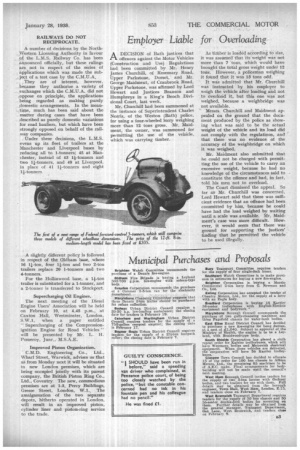Emp loyer Liable
Page 7

If you've noticed an error in this article please click here to report it so we can fix it.
for Overloading
ADECISION of Bath justices that offences against the Motor Vehicles (Construction and Use) Regulations had been committed by Mr. Henry James Churchill, of Rosemary Road, Upper Parkstone, Dorset," and Mr. George Maidment, of Cranbrook Road, Upper Parkstone, was affirmed by Lord Hewart and Justices Branson and Humphreys in a King's Bench Divisional Court, last week.
Mr. Churchill had been summoned at the instance of Superintendent Charles Norris, of the Weston (Bath) police, for using a four-wheeled lorry weighing more than 12 tons gross. Mr. Maidment, the owner, was summoned for permitting the use of the vehicle, which was carrying timber.
As tirnber is loaded according to size, it was assumed that its weight was not more than 7 tons, which wcaild have brought the total gross weight under 12 tons. However, a policeman weighing it found that it was 11 tons odd.
It was admitted that Mr. Churchill was instructed by his employer to weigh the Vehicle after loading and not to overload it, but this one was not weighed, because a weighbridge was not available.
Messrs. Churchill and Maidment appealed on the ground that the document produced by the police as showing what was said to be the actual weight of the vehicle and its load did not comply with the regulatinns, and that there was no evidence of the accuracy of the weighbridge on which it was weighed.
Mr. Maidment also submitted that he could not be charged with permitting the use of the vehicle to carry an excessive weight, because he had no knowledge of the circumstances said to constitute the offence and had, in fact, told his men not to overload.
The Court dismissed the appeal. So far as Mr. Churchill was concerned, Lord Hewart said that there was sufficient evidence that an offence had been committed by him, because he could have had the load weighed by waiting until a scale was available. Mr. Maidment's case was more difficult. However, it would seem that there was ground for supporting the justices' finding that he permitted the vehicle to be used illegally.
































